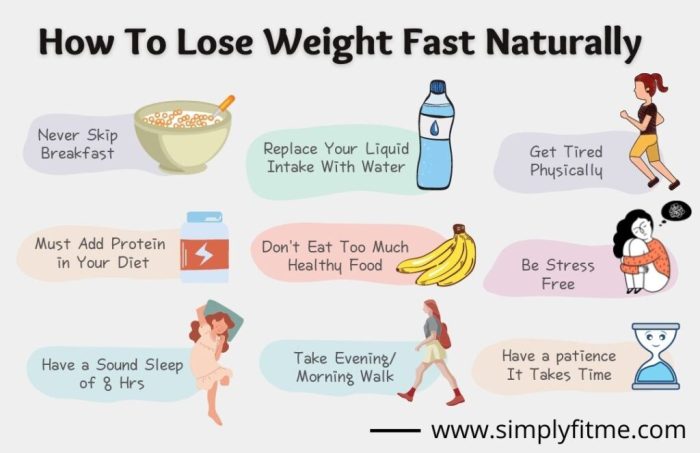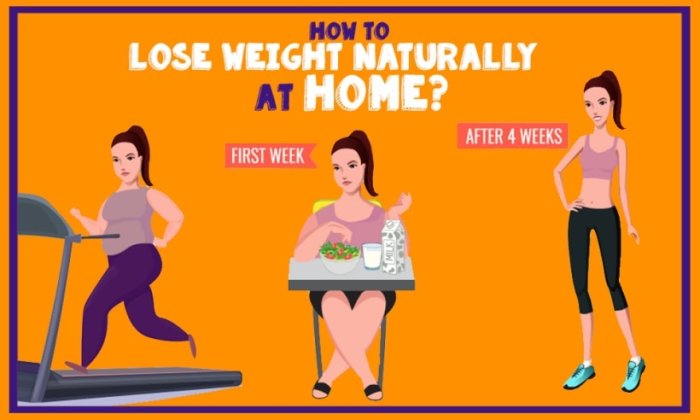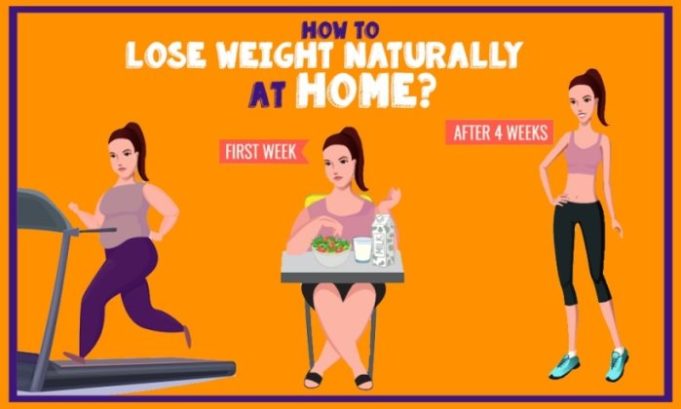How to lose weight in a week naturally is a question that many people ask, especially those seeking a quick fix to shed pounds. While it’s possible to lose some weight in a short period, it’s crucial to approach this goal with a realistic mindset and a focus on sustainable, healthy habits.
This guide provides a comprehensive overview of strategies that can help you achieve your desired weight loss in a week, while emphasizing the importance of long-term health and well-being.
This guide will explore various aspects of weight loss, from understanding the basics of calorie deficit and metabolism to implementing practical tips for healthy eating, effective exercise, and lifestyle changes. We’ll delve into the nuances of rapid weight loss, addressing common concerns and providing guidance on managing potential side effects.
By the end of this guide, you’ll have a solid foundation for making informed decisions about your weight loss journey, empowering you to achieve your goals safely and effectively.
Understanding Weight Loss
Losing weight naturally is about making sustainable changes to your lifestyle, focusing on healthy habits that promote fat loss and overall well-being. It’s not a quick fix, but a journey that requires understanding the fundamentals of weight loss.
Calorie Deficit and Metabolism
Weight loss occurs when you consume fewer calories than your body burns. This is known as a calorie deficit. Your metabolism plays a crucial role in this process. Metabolism refers to the chemical processes that occur in your body to maintain life, including burning calories for energy.
When you consume fewer calories than your body needs, your body taps into stored fat for energy, leading to weight loss.
Fat Loss vs. Water Weight
It’s essential to differentiate between losing fat and losing water weight. Water weight fluctuations are common, often caused by factors like hydration levels, salt intake, and hormonal changes. These fluctuations can cause temporary weight changes, but they don’t represent actual fat loss.
While losing a significant amount of weight in a week naturally might be challenging, incorporating healthy habits and lifestyle changes can definitely kickstart your weight loss journey. If you’re looking for ways to achieve faster results, consider exploring strategies for how to lose weight fast and healthy at home.
Remember, sustainable weight loss is about making long-term changes that fit your lifestyle, and a week is just the beginning of your transformation.
True weight loss involves reducing body fat, which takes time and consistent effort.
Setting Realistic Weight Loss Goals, How to lose weight in a week naturally
Setting realistic weight loss goals is crucial for success. Aim for a healthy and sustainable rate of weight loss, which is typically 1-2 pounds per week.
Healthy Eating for Quick Weight Loss
To achieve quick weight loss, adopting a healthy eating plan is crucial. It involves making mindful choices about the foods you consume and how much you eat. This approach focuses on nutrient-dense foods, promoting satiety while providing essential vitamins and minerals.
Sample Meal Plan for a Week
A sample meal plan that incorporates nutrient-dense foods is Artikeld below:
Monday
- Breakfast: Oatmeal with berries and nuts
- Lunch: Salad with grilled chicken or fish
- Dinner: Baked salmon with roasted vegetables
Tuesday
- Breakfast: Greek yogurt with fruit and granola
- Lunch: Leftover baked salmon with roasted vegetables
- Dinner: Lentil soup with whole-wheat bread
Wednesday
- Breakfast: Whole-wheat toast with avocado and egg
- Lunch: Chicken breast with quinoa and steamed vegetables
- Dinner: Vegetarian chili with brown rice
Thursday
- Breakfast: Smoothie with fruit, vegetables, and protein powder
- Lunch: Leftover vegetarian chili with brown rice
- Dinner: Turkey meatballs with spaghetti squash
Friday
- Breakfast: Scrambled eggs with spinach and whole-wheat toast
- Lunch: Tuna salad sandwich on whole-wheat bread
- Dinner: Chicken stir-fry with brown rice
Saturday
- Breakfast: Pancakes made with whole-wheat flour and fruit
- Lunch: Leftover chicken stir-fry with brown rice
- Dinner: Pizza with whole-wheat crust, vegetables, and lean protein
Sunday
- Breakfast: Waffles made with whole-wheat flour and fruit
- Lunch: Salad with grilled chicken or fish
- Dinner: Roasted chicken with mashed sweet potatoes and green beans
Importance of Hydration
Staying hydrated is crucial for overall health and weight management. Water helps regulate body temperature, flushes out toxins, and aids in digestion.
Daily Water Intake
The general recommendation for daily water intake is 8 glasses, but this can vary based on factors such as activity level, climate, and individual needs.
It’s essential to listen to your body and drink water throughout the day, even when you don’t feel thirsty.
Tips for Reducing Portion Sizes and Avoiding Unhealthy Snacks
Portion control is key to weight loss.
While losing weight in a week naturally is a challenging goal, focusing on healthy habits like drinking plenty of water, getting enough sleep, and managing stress can make a difference. It’s important to remember that sustainable weight loss takes time and effort.
If you’re looking for alternative approaches, you might be interested in exploring methods like How to lose weight without exercise and diet. Ultimately, the key to success is finding a strategy that works for you and that you can stick with long-term.
Reducing Portion Sizes
- Use smaller plates and bowls.
- Divide meals into smaller portions and eat them throughout the day.
- Read food labels and be mindful of serving sizes.
Avoiding Unhealthy Snacks
- Keep unhealthy snacks out of sight and reach.
- Plan healthy snacks ahead of time.
- Drink water or unsweetened tea when cravings strike.
Exercise for Accelerated Results
To achieve faster weight loss, incorporating exercise into your routine is crucial. It complements healthy eating by burning calories, boosting metabolism, and building muscle mass.
Daily Workout Routine
A well-rounded daily workout routine should include both cardio and strength training exercises. This combination helps you burn calories, build muscle, and improve overall fitness. Here’s a sample routine:
- Cardio:Start with 30 minutes of moderate-intensity cardio, such as brisk walking, jogging, cycling, or swimming. Cardio exercises elevate your heart rate, burning calories and improving cardiovascular health.
- Strength Training:Follow up with 30 minutes of strength training, focusing on major muscle groups like legs, arms, back, and chest. Examples include squats, lunges, push-ups, rows, and planks. Strength training helps build muscle, which boosts metabolism and burns more calories even at rest.
Benefits of High-Intensity Interval Training (HIIT)
High-intensity interval training (HIIT) is a highly effective form of exercise for weight loss. It involves alternating between short bursts of intense exercise and brief recovery periods. This method has been shown to burn more calories than traditional steady-state cardio in a shorter amount of time.
HIIT workouts can burn up to 30% more calories than steady-state cardio in the same amount of time.
- Increased Calorie Burn:HIIT workouts significantly elevate your heart rate, leading to a higher calorie burn during and after the workout.
- Improved Metabolism:HIIT exercises have been shown to boost metabolism for hours after the workout, contributing to continued calorie burning.
- Enhanced Fat Loss:Studies have demonstrated that HIIT is more effective than traditional cardio in reducing body fat percentage.
Consistency and Routine
Staying consistent with your exercise routine is essential for achieving sustainable weight loss. Building a routine helps you make exercise a habit, increasing your likelihood of sticking to it long-term.
- Set Realistic Goals:Start with achievable exercise goals and gradually increase intensity and duration as you progress.
- Schedule Exercise:Block out specific times in your schedule for exercise and treat it as an important appointment.
- Find Activities You Enjoy:Choose exercises that you find enjoyable to make it more likely you’ll stick with them.
- Make it a Social Activity:Exercise with a friend or join a group fitness class for motivation and support.
Lifestyle Changes for Sustainable Weight Loss
Beyond diet and exercise, lifestyle changes play a crucial role in achieving and maintaining a healthy weight. By addressing factors that influence your overall well-being, you can create a sustainable approach to weight management.
Getting Enough Sleep and Managing Stress
Sleep and stress have a profound impact on your body’s hormonal balance, affecting appetite and metabolism. When you’re sleep-deprived, your body produces more of the stress hormone cortisol, which can lead to increased cravings for sugary and fatty foods. Conversely, adequate sleep helps regulate hormone levels, promoting feelings of fullness and reducing cravings.
While losing a significant amount of weight in a week naturally is challenging, it’s possible to make healthy changes that can kickstart your journey. A balanced diet is key, and focusing on lean protein, complex carbohydrates, and healthy fats is a great start.
For a comprehensive guide on the best diet for both weight loss and muscle gain, check out this article: The best diet for weight loss and muscle gain. Remember, sustainable weight loss is about making long-term changes, not quick fixes.
Stress can also trigger emotional eating and hinder your weight loss efforts.
- Aim for 7-9 hours of quality sleep each night. Create a relaxing bedtime routine, such as taking a warm bath, reading a book, or listening to calming music.
- Practice stress-reducing techniques like yoga, meditation, deep breathing exercises, or spending time in nature. Engaging in activities you enjoy can also help alleviate stress.
- Identify and address stressors in your life. This may involve setting boundaries, delegating tasks, or seeking professional help if needed.
Mindful Eating and Hunger Cues
Mindful eating is a practice of paying attention to your body’s hunger and fullness cues. By becoming more aware of your eating habits, you can make healthier choices and avoid overeating.
- Eat slowly and savor each bite. This allows your body to register fullness signals before you overeat.
- Pay attention to your hunger and fullness levels. Don’t eat out of boredom, stress, or emotional triggers.
- Avoid distractions while eating. Put away your phone and focus on the experience of eating.
Social Support and Accountability
Having a support system can be invaluable in your weight loss journey. Surround yourself with people who encourage and motivate you.
- Join a support group or online community for weight loss. Sharing experiences and challenges with others can provide valuable insights and encouragement.
- Find an accountability partner who shares your goals. Regularly check in with each other to stay motivated and on track.
- Talk to your doctor or a registered dietitian for professional guidance and support.
Addressing Common Concerns: How To Lose Weight In A Week Naturally

It’s natural to have concerns when embarking on a rapid weight loss journey. While aiming for quick results can be motivating, it’s crucial to understand the potential side effects and prioritize your health.
Potential Side Effects of Rapid Weight Loss
Rapid weight loss can lead to various side effects, including:
- Fatigue and weakness:When you drastically reduce your calorie intake, your body may experience fatigue and weakness due to insufficient energy levels.
- Headaches:Dehydration and electrolyte imbalances, often associated with rapid weight loss, can trigger headaches.
- Constipation:Changes in diet, particularly a decrease in fiber intake, can contribute to constipation.
- Nutrient deficiencies:A restrictive diet may lead to deficiencies in essential vitamins and minerals, potentially impacting your overall health.
- Gallstones:Rapid weight loss can increase the risk of gallstones, which are small, hard deposits that form in the gallbladder.
- Muscle loss:While aiming to lose fat, rapid weight loss can also result in muscle loss, which can weaken your body.
Managing these side effects often involves:
- Gradual weight loss:Aiming for a healthy weight loss rate of 1-2 pounds per week is generally recommended to minimize side effects.
- Adequate hydration:Drinking plenty of water is crucial to prevent dehydration, which can contribute to headaches and fatigue.
- Balanced diet:Ensure your diet is rich in fruits, vegetables, and whole grains to provide essential nutrients and prevent deficiencies.
- Regular exercise:Engage in moderate-intensity exercise to maintain muscle mass and boost energy levels.
- Consultation with a healthcare professional:Seeking advice from a doctor or registered dietitian can help address individual concerns and create a safe and effective weight loss plan.
Importance of Consulting a Healthcare Professional
Consulting a healthcare professional before making significant dietary or exercise changes is essential for several reasons:
- Personalized advice:A healthcare professional can assess your individual health status, medical history, and goals to provide personalized advice and create a safe and effective weight loss plan.
- Identifying underlying conditions:Rapid weight loss can sometimes be a symptom of an underlying medical condition. A healthcare professional can rule out any potential issues.
- Monitoring progress:Regular checkups with a healthcare professional can help monitor your progress, identify any potential complications, and adjust your plan as needed.
- Addressing potential side effects:A healthcare professional can provide guidance on managing potential side effects and ensuring your overall well-being during your weight loss journey.
Maintaining Motivation and Avoiding Setbacks
Staying motivated and avoiding setbacks during weight loss is crucial for long-term success. Here are some tips:
- Set realistic goals:Aim for gradual, sustainable weight loss rather than drastic changes. This approach is more likely to lead to long-term success.
- Find a support system:Surround yourself with supportive friends, family, or a weight loss group to encourage you and keep you accountable.
- Celebrate small victories:Acknowledge and celebrate your achievements, no matter how small, to stay motivated and recognize your progress.
- Be prepared for setbacks:Expect setbacks and don’t let them derail your efforts. Learn from your mistakes and get back on track.
- Focus on healthy habits:Instead of solely focusing on the number on the scale, prioritize building healthy habits that you can maintain long-term.
- Find activities you enjoy:Choose exercise activities that you find enjoyable to make it more sustainable and less likely to give up.
- Be patient and persistent:Weight loss takes time and effort. Be patient with yourself and stay persistent in your efforts.
Final Wrap-Up

Losing weight in a week naturally is achievable, but it requires commitment and dedication. By adopting a balanced approach that incorporates healthy eating, regular exercise, and mindful lifestyle changes, you can see noticeable results in a short period. Remember that sustainable weight loss is a journey, not a sprint.
Focus on building healthy habits that you can maintain over time, and celebrate every milestone along the way. Always consult with a healthcare professional before making significant dietary or exercise changes to ensure that your approach is safe and effective for your individual needs.
FAQs
Is it safe to lose weight quickly?
While it’s possible to lose weight quickly, rapid weight loss can be unsustainable and may lead to nutrient deficiencies or muscle loss. Aim for a gradual and healthy weight loss of 1-2 pounds per week for sustainable results.
What are some common side effects of rapid weight loss?
Common side effects of rapid weight loss include fatigue, headaches, dizziness, and constipation. These side effects are often temporary and can be managed by staying hydrated, eating a balanced diet, and getting enough rest.
Can I lose weight without exercising?
While diet plays a significant role in weight loss, exercise is essential for maintaining muscle mass and improving overall health. Aim for at least 30 minutes of moderate-intensity exercise most days of the week.
























